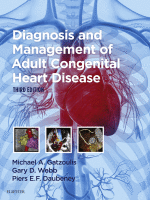Physical Address
304 North Cardinal St.
Dorchester Center, MA 02124

Adults with congenital heart disease (ACHD) are an expanding population who pose a significant challenge to the medical professionals who are caring for them. Although early surgery has transformed the outcome of these patients, it has not been curative. Exercise…

Most patients with congenital heart lesions are diagnosed in infancy or childhood and then undergo palliative and/or reparative surgery. Despite ongoing advances in cardiac surgery and intervention, residual anatomic and hemodynamic abnormalities remain common among such individuals. A large proportion…

† Deceased. Congenital malformations of the heart, by definition, originate in the embryo, then evolve during gestation, and change considerably during the course of extrauterine life. Before World War II, these malformations were regarded as hopeless futilities. Abbott was advised…

As a result of the genetic revolution, the impact of genetics must be considered in the diagnosis, management, and treatment of the patient populations of most specialty clinics. It is likely that genetic information will eventually transform the definitions and…

The care of adults with congenital heart malformations has evolved into a specialty in its own right. The malformations are conceived by the general cardiologist as extremely complex, requiring a sound knowledge of embryologic development for their appreciation. The defects…

You’re Reading a Preview Become a Clinical Tree membership for Full access and enjoy Unlimited articles Become membership If you are a member. Log in here

Congenital heart disease (CHD) lesions occur during embryonic development and consist of abnormal formations of the heart walls, valves, or blood vessels. The dramatic improvement in CHD diagnosis and continued progress of CHD interventions since the 1960s have resulted in…